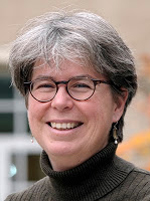While they were eating, he took bread, said the blessing, broke it, and gave it to them, and said, “Take it; this is my body.” Mark 14:22
Where is God? As I sat in church on the vigil of the Feast of Corpus Christi, it seemed very clear where God was. On the altar, the Body and Blood, under the appearances of bread and wine. In those gathered to celebrate, the priest and the assembly. In the Word proclaimed and preached. Christ is here, truly present in all these different ways. The Mass ended, we got in the car and went home.
On Sunday morning, I watch furiously as a woman runs a stop sign, all the while chatting on her cell phone. Sunday night, I’m sleeping at the local shelter, feeling helpless in the face of an inconsolable child and her exhausted mother. Monday finds me seething as two people cut in front of me in line at the grocery store. Where is God, now?
An anonymous Carthusian writes, “[God] is … wholly present wherever he acts, that is to say, everywhere. Open your eyes. You will see signs of him everywhere ….” It is, he points out, a practice, one that requires a continual mindfulness, a particular way of seeing the world. Can I see the many ways the Body of Christ is held up in this world?
[hotblock]
I want to squeeze my eyes closed and avoid looking at the person cutting me off in traffic or ducking in front of me to take the last loaf of bread. I struggle, too, with the situations that I cannot put right, where nothing I can do in that moment will help. The friend in intractable pain, the child who is overtired and sleeping in yet another new place, replete with strangers.
Benedictine monk and liturgical scholar Godfrey Dieckmann, O.S.B., famously asked his students, “What difference does it make if the bread and wine become the Body and Blood of Christ, if we don’t?”
When I say “amen” to the Body of Christ, when I assent to bearing within me God made flesh, when I profess my desire to become what I am about to receive, does this mean am I willing to say “yes” to being helpless, to being crucified on another’s cross? To be present to the exhausted mother, to listen to the friend in pain. Does it mean I can see beyond the mindlessly rushing drivers to see, however blurred, God’s presence?
I have less trouble finding Christ, as St. John Chrysostom would say, in either the beggar at the church door or in the chalice, than I do in seeing the face of God in the troublesome, than I do when faced with painful situations that call out for something I cannot provide. Still, I trust that Christ’s presence in the bread and wine has made a difference, that God-within-me will recognize God within my neighbor, and so open my eyes to see God as well.
To pray:
Jesus, may all that is you flow into me.
May your body and blood be my food and drink.
May your passion and death be my strength and life.
Jesus, with you by my side, enough has been given.
May the shelter I seek be the shadow your cross.
Let me not run from the love which you offer,
But hold me safe from the forces of evil.
On each my dyings shed your light and your love.
Keep calling to me until that day comes, when, with your saints,
I may praise you forever. Amen.
Anima Christi translated by David Fleming, S.J. in Hearts on Fire
***
Michelle Francl-Donnay is a member of Our Lady of Good Counsel Parish, Bryn Mawr.
PREVIOUS: Real Christians serve others as Christ did, pope says
NEXT: Abuse victim loves the church, wants healing




Share this story